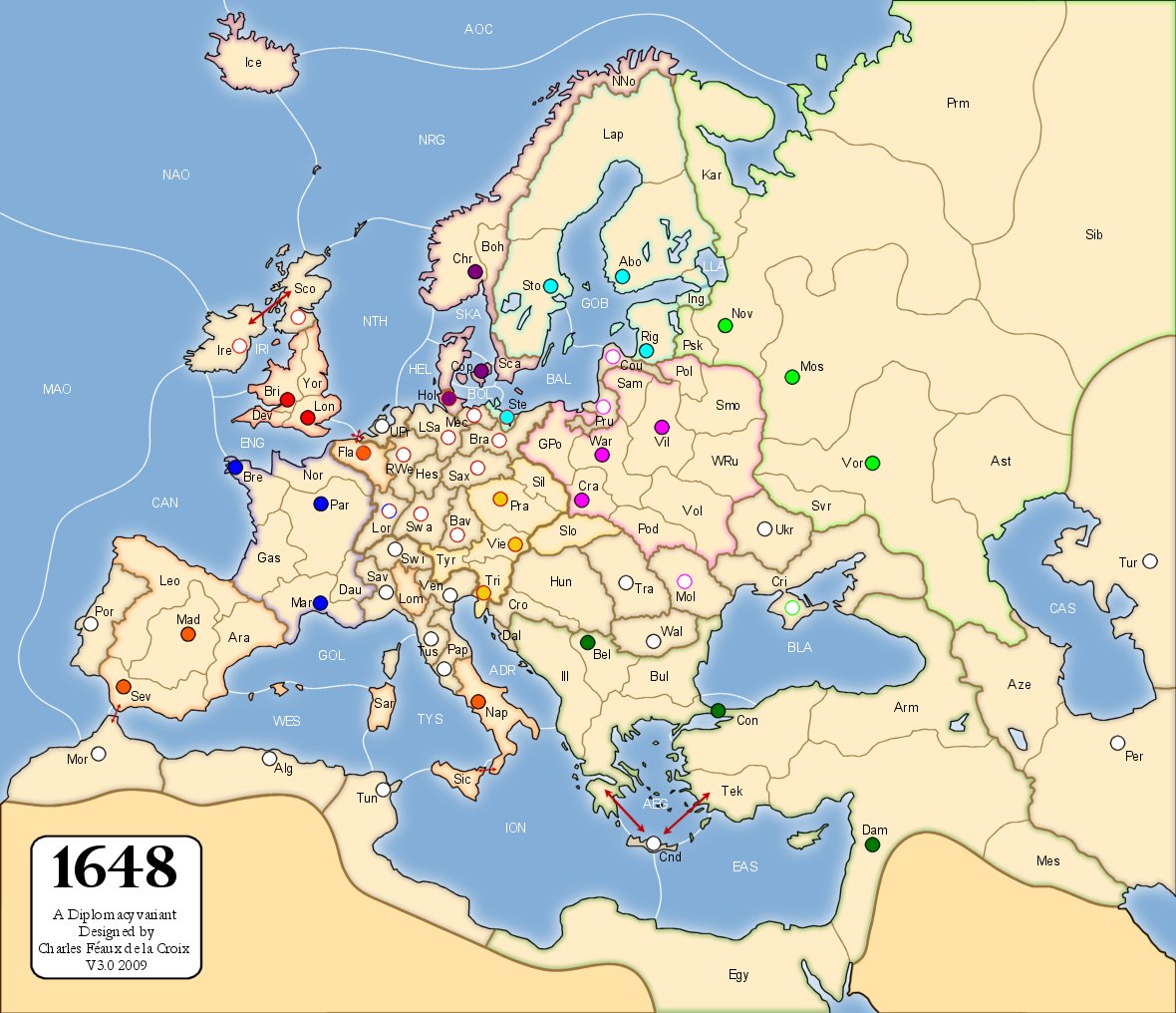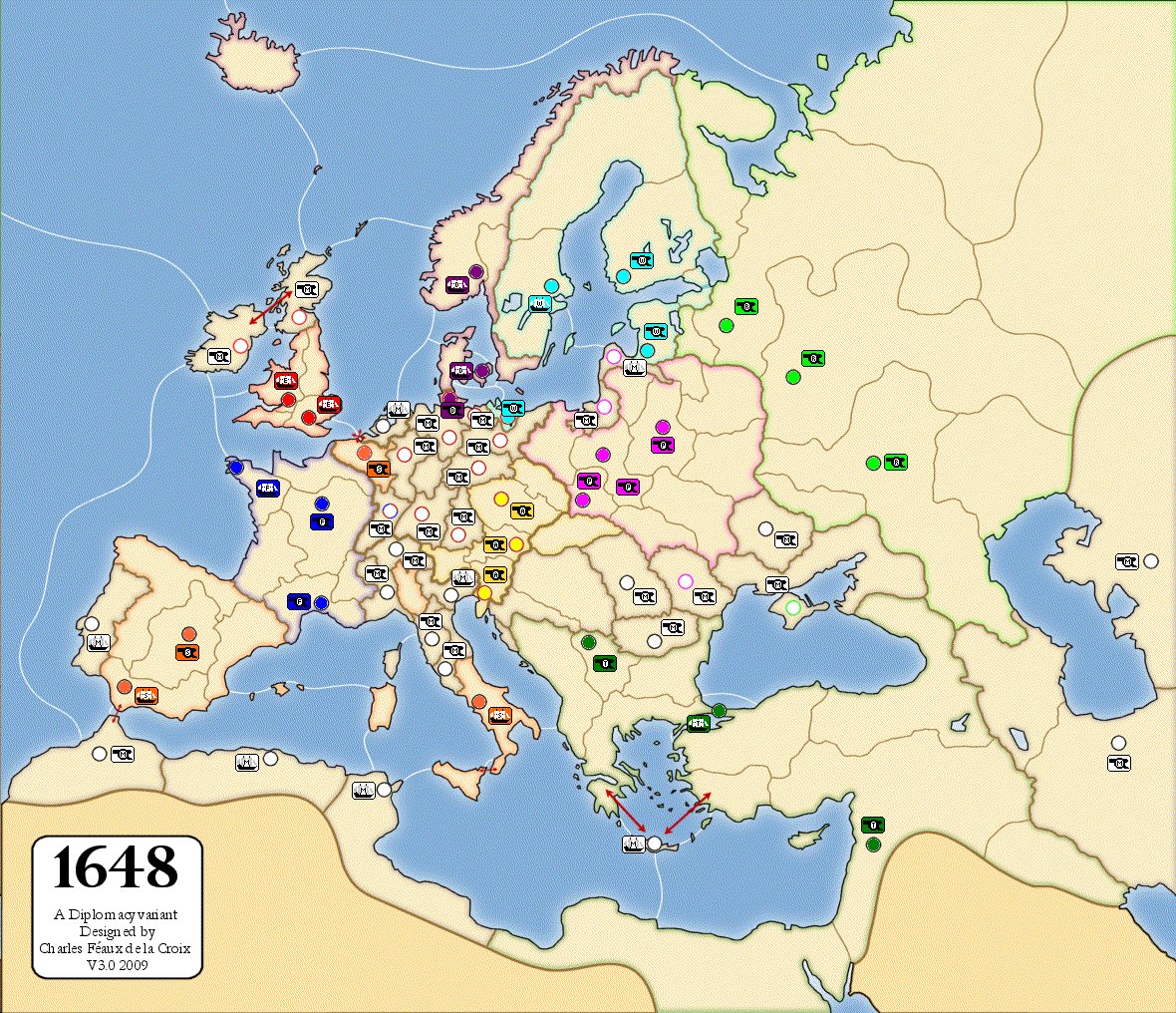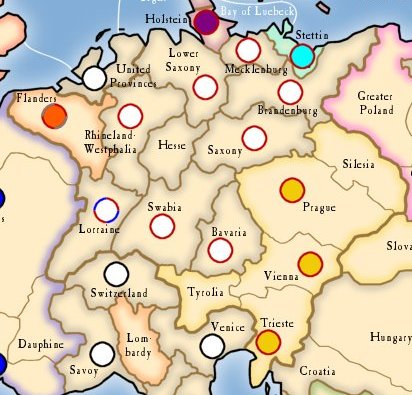Difference between revisions of "1648"
| Line 210: | Line 210: | ||
All spaces on the 1648 map, along with their abbreviations, are listed below. SCs are anno-tated with an asterisk (*). | All spaces on the 1648 map, along with their abbreviations, are listed below. SCs are anno-tated with an asterisk (*). | ||
| − | |||
| − | |||
| − | |||
| − | |||
| − | |||
| − | |||
| − | |||
| − | |||
| − | |||
| − | |||
| − | |||
| − | |||
| − | |||
| − | |||
| − | |||
| − | |||
| − | |||
| − | |||
| − | |||
| − | |||
| − | |||
| − | |||
| − | |||
| − | |||
| − | |||
| − | |||
| − | |||
| − | |||
| − | |||
| − | |||
| − | |||
| − | |||
| − | |||
| − | |||
| − | |||
| − | |||
| − | |||
| − | |||
| − | |||
| − | |||
| − | |||
| − | |||
| − | |||
| − | |||
| − | |||
| − | |||
| − | |||
| − | |||
| − | |||
| − | |||
| − | |||
| − | |||
| − | |||
| − | |||
| − | |||
| − | |||
| − | |||
| − | |||
| − | |||
| − | |||
| − | |||
| − | |||
| − | |||
| − | |||
| − | |||
| − | |||
| − | |||
| − | |||
| − | |||
| − | |||
| − | |||
| − | |||
| − | |||
| − | |||
| − | |||
| − | |||
| − | |||
| − | |||
| − | |||
| − | |||
| − | |||
| − | |||
| − | |||
| − | |||
| − | |||
| − | |||
| − | |||
| − | |||
| − | |||
| − | |||
| − | |||
| − | |||
| − | |||
| − | |||
| − | |||
| − | |||
| − | |||
| − | |||
| − | |||
| − | |||
| − | |||
| − | |||
| − | |||
| − | |||
| − | |||
| − | |||
| − | |||
| − | |||
| − | |||
| − | |||
| − | |||
| − | |||
| − | |||
| − | |||
| − | |||
| − | |||
| − | |||
| − | |||
| − | |||
| − | |||
| − | |||
| − | |||
| − | |||
| − | |||
| − | |||
| − | |||
| − | |||
| − | |||
| − | |||
| − | |||
| − | |||
| − | |||
| − | |||
| − | |||
| − | |||
| − | |||
| − | |||
| − | |||
| − | |||
| − | |||
| − | |||
| − | |||
| − | |||
| − | |||
| − | |||
| − | |||
| − | |||
| − | |||
| − | |||
| − | |||
| − | |||
| − | |||
| − | |||
| − | |||
| − | |||
| − | |||
| − | |||
| − | |||
| − | |||
| − | |||
| − | |||
| − | |||
| − | |||
| − | |||
| − | |||
| − | |||
| − | |||
| − | |||
| − | |||
| − | |||
| − | |||
| − | |||
| − | |||
| − | |||
| − | |||
| − | |||
| − | |||
| − | |||
| − | |||
| − | |||
| − | |||
| − | |||
| − | |||
| − | |||
| − | |||
| − | |||
| − | |||
| − | |||
| − | |||
| − | |||
| − | |||
| − | |||
| − | |||
| − | |||
| − | |||
| − | |||
| − | |||
| − | |||
| − | |||
| − | |||
| − | |||
| − | |||
| − | |||
| − | |||
| − | |||
| − | |||
| − | |||
| − | |||
| − | |||
| − | |||
| − | |||
| − | |||
| − | |||
| − | |||
| − | |||
| − | |||
| − | |||
| − | |||
| − | |||
| − | |||
| − | |||
| − | |||
| − | |||
| − | |||
| − | |||
| − | |||
| − | |||
| − | |||
| − | |||
| − | |||
| − | |||
| − | |||
| − | |||
| − | |||
| − | |||
| − | |||
| − | |||
| − | |||
| − | |||
| − | |||
| − | |||
| − | |||
| − | |||
| − | |||
| − | |||
| − | |||
| − | |||
| − | |||
| − | |||
| − | |||
| − | |||
| − | |||
| − | |||
Revision as of 17:28, 7 October 2009
Introduction
1648 is a nine-player Diplomacy variant set in Europe following the Peace of Westphalia, the first adjucated season being Spring 1649.
1648's rules are based upon those of Ambition & Empire, a variant designed by Jeff Kase and Baron Powell. As its most striking departure from Standard Diplomacy, the latter first featured armed neutrals whose actions players may secretly influence by bidding Diplomacy Points (DPs).
Should you be interested in joining or observing a future game, contact me.
Maps
The map (v3.0) with space abbreviations:
Rules
All the rules of standard Diplomacy apply save those noted below:
Great Powers
Initial Setup
Austria: A Prague, A Trieste, A Vienna. Denmark-Norway: F Christiania, F Copenhagen, A Holstein. England: F Bristol, F London. France: F Brest, A Marseille, A Paris. Ottoman Empire: A Belgrade, F Constantinople, A Damascus. Poland-Lithuania: A Cracow, A Vilna, A Warsaw. Russia (Muscovy): A Moscow, A Novgorod, A Voronezh. Spain: A Flanders, A Madrid, F Naples, F Seville. Sweden: A Abo, A Riga, A Stettin, F Stockholm (East Coast).
Home Supply Centers (HSCs)
Note the additional HSCs (underlined below) on top of those controlled at the start of the game and Flanders not being considered a Spanish HSC.
Austria: Prague, Trieste, Vienna. Denmark-Norway: Christiania, Copenhagen, Holstein. England: Bristol, London, Ireland, Scotland. France: Brest, Marseille, Paris, Lorraine. Ottoman Empire: Belgrade, Constantinople, Damascus. Poland-Lithuania: Cracow, Vilna, Warsaw, Courland, Moldavia, Prussia. Russia (Muscovy): Moscow, Novgorod, Voronezh, Crimea. Spain: Madrid, Naples, Seville. Sweden: Abo, Riga, Stettin, Stockholm.
Holy Roman Empire (of the German Nation)
The Holy Roman Emperor may build in any SC within the Holy Roman Empire (HRE) he controls. Following SCs (marked by a burgundy red circle border) belong to the HRE (hereafter HRESCs):
- Bavaria
- Brandenburg
- Flanders
- Holstein
- Lorraine
- Lower Saxony
- Mecklenburg
- Prague
- Rhineland-Westphalia
- Stettin
- Saxony
- Swabia
- Trieste
- Vienna
The Great Power owning the most HRESCs is considered the Holy Roman Emperor and enjoys the described building privileges. The title only is transferred whenever one single Great Power other than the present office-holder (initially Austria) has the most HRESCs.
Minor Powers
In addition to the nine Great Powers, there is also a host of "minor powers", which are non-player neutral Supply Centres (SCs) representing the smaller states of Europe, North Africa and the Near East. These include (space names in bold) the following:
- The Regency of Algiers (an autonomous province of the Ottoman Empire)
- The Electorate of Bavaria
- The Electorate of Brandenburg
- The Venetian Colony of Candia
- The Duchy of Courland (an autonomous fiefdom of Poland-Lithuania)
- Rhineland-Westphalia (representing various territories belonging to the Lower-Rhenish, Electoral Rhenish and Lower Saxonian imperial circles)
- The Khanate of Crimea (a vassal state of the Ottoman Empire that includes the lands of the Crimean and Nagay Tatars)
- The Kingdom of Ireland
- The Duchy of Lorraine
- Lower Saxony (representing various territories belonging to the Lower Saxonian and Lower Rhenish-Westphalian imperial circles)
- Mecklenburg (representing the Duchies of Mecklenburg)
- The Principality of Moldavia (a vassal state of the Ottoman Empire)
- The Sultanate of Morocco
- The Papal States
- Persia (the Persian Empire)
- The Kingdom of Portugal
- The Duchy of Prussia (an autonomous fiefdom of Poland-Lithuania)
- The Duchy of Savoy
- The Kingdom of Scotland
- Swabia (representing various territories belonging to the Swabian, Franconian and Upper Rhenish imperial circles)
- The Swiss Confederation (Switzerland)
- The Principality of Transylvania
- The Regency of Tunis (an autonomous province of the Ottoman Empire)
- Turkestan
- The Grand Duchy of Tuscany
- The United Provinces of the Netherlands
- The Republic of Venice
- The Cossack Hetmanate of the Ukraine
- The Principality of Wallachia (a vassal state of the Ottoman Empire)
Each minor power, although a "non-player," starts with a unit (unit color is black). All minor powers start with an army except for the following minors that start with a fleet: Algiers, Candia, Courland, Portugal, Tunis, the United Provinces and Venice.
Minor power units prevent a Great Power from simply moving into an empty space and gain-ing control of the SC. To occupy a minor power SC, a Great Power will need to move in with support. A minor power unit that is forced to retreat is disbanded. If a Great Power does not occupy the minor power SC at the end of a Fall turn, the minor power’s unit is automatically rebuilt in the Winter.
As in standard Diplomacy, a Great Power controls a minor power SC when one of its units occupies the space after a Fall turn has been played and completed. Once a Great Power gains control of a minor power SC, it can leave the SC vacant and still keep control of it as long as that SC is not occupied by another Great Power at the close of a Fall turn.
Minor power units do nothing but hold in place, unless the unit has been ordered by a Great Power using its Diplomacy Points.
Diplomacy Points
At the start of the Spring and Fall turns, each Great Power receives one Diplomacy Point (DP) for each SC it controls, up to a maximum of three DPs per turn. During each Spring and Fall turn, each Great Power may allocate none, some, or all of its DPs to minor powers that still have units on the map, though no more than two of its DPs may be allocated to a particular minor power. (Design Note: This is a departure from the Ambition & Empire rules.)
For each DP allocated, the allocating Great Power submits an order for that particular minor power’s unit. A Great Power may only order a minor power to hold or support. A minor power can not be ordered to move/attack.
Unused DPs may not be carried over into the next turn. They are simply lost.
Players are not required to tell each other how they allocated their DPs. Just as with negotia-tions, players may honour their agreements with other players or not, as they see fit. Only the GM will know how Great Powers have allocated their DPs. DP allocation is not published in the adjudication; only the end results are published.
The GM determines how DPs have been allocated. In the event of a conflict, an order for a particular minor power’s unit is followed if it is supported by more DPs than any conflicting order. See the following example:
In Spring 1649, Austria allocates one DP to Swabia to get it to support an Austrian attack on Bavaria. France allocates one DP to Swabia to get it to support a French attack on Lorraine. In support of Austria, Spain allocates one DP to Swabia to get it to support the Austrian attack on Bavaria. Although Austria, France and Spain each allocated one DP to Swabia, the Austrians get the Swabian support because the Spaniards supported the Austrian diplomatic efforts with the Swabians.
If, during a Spring or Fall turn, a Great Power allocates more DPs to minor powers than it is entitled to or exceeds the limit of allocating two of its DPs to one particular minor power, all of that Great Power’s DPs are forfeited for that particular turn.
Civil Disorder
If a player is lost during the game, the GM is strongly encouraged to find a replacement player for the affected Great Power rather than have it lapse into civil disorder. In the event no replacement player is found and the GM declares the Great Power to be in permanent civil disorder, the following rules apply:
- All units of the Great Power in civil disorder (GPCD) are immediately disbanded.
- All SCs controlled by the GPCD that are unoccupied are immediately considered newly independent minor powers. Minor power army units are built in those minor power spaces.
- All SCs controlled by the GPCD that are occupied by a unit belonging to another Great Power are unaffected. If the occupying Great Power moves its unit out of the GPCD’s SC so that the SC is unoccupied at the conclusion of a Fall turn, a minor power army unit is built there and that SC is considered a newly independent minor power.
- For the remainder of the game, all newly independent minor powers are subject to the provisions of regarding minor powers. In particular, this means the new minor power can be influenced using Diplomacy Points.
- Once a Great Power is declared to be in permanent civil disorder, it may not be played by an active player again.
Victory Conditions
As soon as one Great Power controls 18 SCs, the game ends immediately and the player rep-resenting that Great Power is the winner.
If two Great Powers each gain control of 18 or more SCs at the same time, the player repre-senting the Great Power with the most SCs is considered the winner. If the two Great Powers each control the same number of SCs, the game continues until one player has 18 or more SCs and that player has more SCs than any other player.
Players may terminate the game by mutual agreement before a winner is determined. If this occurs, any decision reached by the players (e.g., concede game to one player, concede game to an alliance) must be accepted unanimously. If the players cannot agree, all players who still have pieces on the board when the game ends share equally in a draw.
Map Clarifications
• Ingria is a canal province (much as Copenhagen), thus allowing units to move from Abo, Lake Ladoga, the Gulf of Bothnia, Novgorod (South Coast) and Riga to Ingria (and vice versa). The River Neva is shown on the map to indicate this.
• Red arrows indicate that two spaces are adjacent to another, allowing any units to operate across it.
Game Notes
This section will in future be expanded.
Basic Statistical Information
There are a total of 120 spaces on the v2.8 map and are divided as follows:
- 58 SCs
- 28 SCs initially belonging to the Great Powers
- 30 SCs initially in the hands of Minor Powers
- 62 non-SC spaces
- 42 land provinces
- 20 sea spaces
There are thus 2.07 spaces per SC/unit. This falls within the parameters (rations between 2.0 and 2.5) Stephen Agar recommends for Diplomacy variants.
Historical Notes
This section will in future be expanded.
Austria
Emperor Ferdinand III (1637-57) Head of Privy Council: Max, Count Trauttmannsdorff (1634-50)
Denmark-Norway
King Frederick III
Commonwealth of England
Oliver Cromwell (Lord Protector, 1653-58)
France
King Louis XIV, the Sun King (1643-1715) Chief Minister: Jules Mazarin (1643-61)
Ottoman Empire
Sultan Mehmed IV, the Hunter (1648-87) Regent: Kösem Sultan Grand Vizier: Sofu Mehmed Pasha (1648-49)
Poland-Lithuania
King John II Casimir (1648-68)
Russia (Muscovy)
Tsar Alexis (1645-76)
Spain
King Phillip IV (1621-65)
Sweden
Queen Christine (1632-54)
Space Names and Abbreviations
All spaces on the 1648 map, along with their abbreviations, are listed below. SCs are anno-tated with an asterisk (*).


